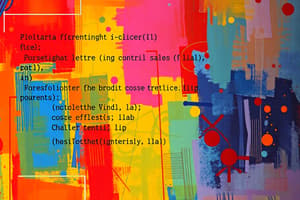Podcast
Questions and Answers
The if statement in C programming executes if the test expression is evaluated to false.
The if statement in C programming executes if the test expression is evaluated to false.
False (B)
The if...else statement can be used to handle multiple conditions in a C program.
The if...else statement can be used to handle multiple conditions in a C program.
True (A)
The syntax of the if statement in C programming requires a condition inside square brackets.
The syntax of the if statement in C programming requires a condition inside square brackets.
False (B)
The if...else ladder can execute multiple statements depending on different test expressions.
The if...else ladder can execute multiple statements depending on different test expressions.
A nested if...else statement cannot contain another if...else statement inside it.
A nested if...else statement cannot contain another if...else statement inside it.
The else block in an if statement is mandatory in C programming.
The else block in an if statement is mandatory in C programming.
In a C program, all statements are executed sequentially unless interrupted by a conditional statement.
In a C program, all statements are executed sequentially unless interrupted by a conditional statement.
The condition inside the if statement must always evaluate to a Boolean value.
The condition inside the if statement must always evaluate to a Boolean value.
A program can use an if statement only for numerical comparisons.
A program can use an if statement only for numerical comparisons.
The if...else statement can be used to check for single conditions only.
The if...else statement can be used to check for single conditions only.
Flashcards
Conditional Statements in C
Conditional Statements in C
Control statements that allow a program to execute different blocks of code based on a condition.
if Statement
if Statement
A conditional statement that executes a block of code only if a specified condition is true.
if...else Statement
if...else Statement
Executes one block of code if a condition is true and another block if it is false.
if...else Ladder
if...else Ladder
Signup and view all the flashcards
Nested if...else
Nested if...else
Signup and view all the flashcards
Test expression
Test expression
Signup and view all the flashcards
Sequential execution
Sequential execution
Signup and view all the flashcards
Decision Making
Decision Making
Signup and view all the flashcards
Control Statements
Control Statements
Signup and view all the flashcards
Conditional Logic
Conditional Logic
Signup and view all the flashcards
Study Notes
Conditional Programming Element - Lesson 4
- Conditional statements in C programming allow the program to execute different code blocks based on whether a condition is true or false.
- This process is also called decision making, and the decision-making statements are control statements.
Objectives
- Understand how conditional statements work in C programming.
- Differentiate between different conditional statements in C.
Conditional Programming in C
- In C programs, code is normally executed sequentially.
- A condition allows the flow of execution to change based on whether a condition is true or false.
if Statement
- Syntax:
if (test expression)
{
/*statements to be executed if the test expression is true*/
}
- The
test expressionis evaluated. - If the expression is true, the statements inside the
ifblock are executed. - If the expression is false, the statements inside the
ifblock are skipped.
How if Statement Works
- The
ifstatement checks thetest expressioninside the parentheses. - If the
test expressionis true, the statements within theifblock are executed. - If the
test expressionis false, the statements within theifblock are not executed.
if...else Statement
- Syntax:
if (test expression) {
/*statements to be executed if the test expression is true*/
}
else {
/*statements to be executed if the test expression is false*/
}
How if...else Statement Works
- The
ifstatement checks thetest expression. If true, the statements inside theifblock are executed; otherwise, the statements inside theelseblock are executed.
if...else Ladder
- Allows checking multiple conditions.
- Syntax:
if (test expression1)
{
// statements
}
else if (test expression2)
{
// statements
}
else if (test expression3)
{
// statements
}
else {
// statements
}
Switch Statement
- Enables executing different code blocks based on various alternatives.
- Often easier to read than multiple
if...elsestatements. - Syntax:
switch (expression) {
case constant1:
// statements break;
case constant2:
// statements break;
// ...
default:
// default statements
}
How Switch Statement Works
- The
Expressionis evaluated - It determines which of the
casestatements matches - If a
casematches, the block of code associated with thatcaseis executed until abreakstatement is encountered. - If no match is found, the
defaultblock is executed.
Examples
- Demonstrates programs to check if a number is negative, check if an integer is odd or even, create a simple calculator using conditional statements in C.
Studying That Suits You
Use AI to generate personalized quizzes and flashcards to suit your learning preferences.
Related Documents
Description
Explore the fourth lesson on conditional programming in C. Understand how conditional statements like 'if' allow for decision-making in code, changing program flow based on true or false evaluations. Differentiate between various conditional statements as you learn their syntax and applications.




